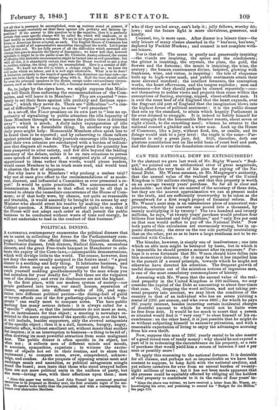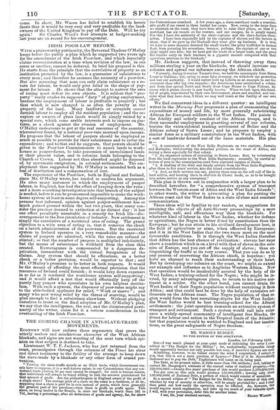CAN THE NATIONAL DEBT BE EXTINGUISHED?
IN the abstract we gave last week of Mr. Rigby Wason's "Bud- get," we pointed out an arithmetical error of great magnitude, which affects the very basis of his plan for paying off the Na- tional Debt. Mr. Wason assumes, on Mr. Macgregor's authority, that the annual value of the realized property of the United Kingdom is 220 millions sterling, and that this property is worth on an average twenty years' purchase. So far all is clear and admissible : not that we are assured of the accuracy of these data, but they are the nearest approximation we can at present make to the truth, and are sufficiently trustworthy to be taken as the groundwork for a first rough project of financial reform. But Mr. Wason's next step is an unconscious piece of numerical con- juration, whereby he converts one pound into a thousand, by merely multiplying it by twenty I- The two hundred and twenty millions, he says, "at twenty years' purchase would produce four billions four hundred and forty millions," and " only five per cent on that sum would suffice to pay off the National Debt. Now both parts of this calculation are enormously wrong, but in op- posite directions; the error on the one side partially neutralizing that on the other, yet so as to leave a large residuum not to be re- conciled with Cocker.
The blunder, however, is simply one of inadvertence ; one into which an able man might be betrayed by haste, but in which it is impossible he should persist a moment after its exposure.* Per- haps it is even fortunate that Mr. Wason should have fallen into this momentary delusion ; for it may be that it has impelled him to the pursuit of a sound principle, towards which he might not otherwise have directed his attention. The frequent growth of useful discoveries out of the mistaken notions of ingenious men, is one of the most consolatory commonplaces of history.
Assuming with Mr. Wason that the annual value of the real- ized property in the United Kingdom is 220 millions, we may consider the capital of the Debt as amounting to about four times that sum. Or, dropping the word millions, and not taking per- sonal property into account, we may liken the condition of the country to that of an individual who has an estate yielding a rental of 2201. per annum, and who owes 8801.; for which he pays 281. yearly interest, besides incurring certain incidental charges of doubtful amount to which he would not be liable were he free from debt. It would be too much to assert that a person so situated would find it "very easy" to clear himself of his en- cumbrance: on the other hand, it is just possible that he might do so without subjecting himself to excessive privations, and with a reasonable expectation of living to enjoy the advantages accruing from his own thrift.
Now, suppose this man of 2201. yearly rental to be also master of a good round sum of ready money : why should he not expend a part of it in redeeming the encumbrance on his property, at a rate of purchase that would yield him a return of between 3 and 4 per cent or possibly more To apply this reasoning to the national fortunes. It is desirable for all classes, and perhaps not so impracticable as we have been content to suppose, to keep faith with the national creditor, and yet relieve ourselves for ever from an annual burden of twenty- eight millions of taxes; but it has not been made apparent that the process could be equitably effected by obliging all the holders of real property to contribute to it in the ratio of four years' in- Since the above was written, we have received a letter from Mr. Wason ac- knowledging his error, and promising to amend his "Budget for the Million." See page 110.
come. In short, Mr. Wason has failed to establish his heroic thesis that it would be very easy and very profitable for the land- owners of the United Kingdom to pay of the Debt. Will he try again? Sir Charles Wood's four attempts at budget-making last year are on record for his encouragement.



























 Previous page
Previous page